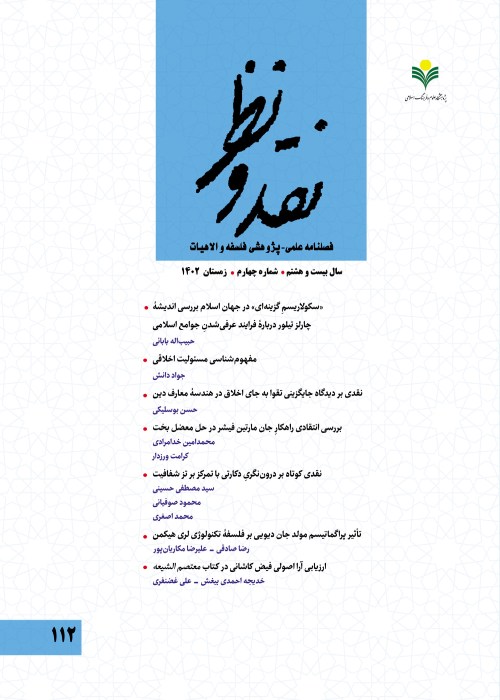An Examination and a Critique of Sabzawari's Account of al-Amr Bayn al-Amrayn
Author(s):
Abstract:
A significant debate within the intellectual community of early Muslims was the relationship between human volitional acts and the system of divine acts, with each school of thought taking a different position concerning it. In general, there are four theories about the relationship: absolute jabr or predetermination, absolute tafwīḍ or freedom (delegation of affairs to human beings), the theory of kasb (acquisition), and the theory of al-amrbayn al-amrayn (something between the two things). The first three theories are propounded by Sunni scholars, and the last theory is propounded by the followers of the Prophets (s) household or Ahl al-Bayt. The problem with the first three theories is that they contradict certain religious doctrines. The theory of al-amrbayn al-amrayn rejects both absolute predetermination and absolute freedom, but its positive proposal has been differently accounted for by Imami scholars. The Shiite philosopher, Sabzawari, has tried to provide a rational or philosophical account of the theory in terms of the ontological principle of the personal unity of the reality of existence. His account is examined in this paper.
Keywords:
Language:
Persian
Published:
Journal of Philosophy & Theology, Volume:22 Issue: 1, 2017
Pages:
20 to 42
magiran.com/p1712087
دانلود و مطالعه متن این مقاله با یکی از روشهای زیر امکان پذیر است:
اشتراک شخصی
با عضویت و پرداخت آنلاین حق اشتراک یکساله به مبلغ 1,390,000ريال میتوانید 70 عنوان مطلب دانلود کنید!
اشتراک سازمانی
به کتابخانه دانشگاه یا محل کار خود پیشنهاد کنید تا اشتراک سازمانی این پایگاه را برای دسترسی نامحدود همه کاربران به متن مطالب تهیه نمایند!
توجه!
- حق عضویت دریافتی صرف حمایت از نشریات عضو و نگهداری، تکمیل و توسعه مگیران میشود.
- پرداخت حق اشتراک و دانلود مقالات اجازه بازنشر آن در سایر رسانههای چاپی و دیجیتال را به کاربر نمیدهد.
In order to view content subscription is required
Personal subscription
Subscribe magiran.com for 70 € euros via PayPal and download 70 articles during a year.
Organization subscription
Please contact us to subscribe your university or library for unlimited access!


